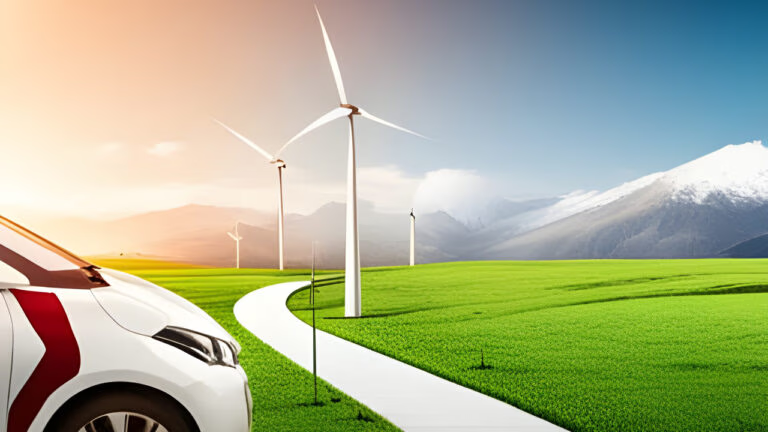Electric Vehicles and Renewable Energy: A Perfect Match
The global push towards sustainability is driving significant advancements in both electric vehicles (EVs) and renewable energy. These two innovations are increasingly being seen as complementary solutions to the pressing environmental challenges we face today. By combining EVs with renewable energy sources, we can create a cleaner, more efficient, and sustainable transportation system. This article explores how electric vehicles and renewable energy form a perfect match and the benefits of this synergy.
The Rise of Electric Vehicles
Electric vehicles have gained immense popularity due to their potential to reduce greenhouse gas emissions, lower fuel costs, and decrease reliance on fossil fuels. Unlike traditional internal combustion engine (ICE) vehicles, EVs run on electricity, which can be generated from various energy sources, including renewables. The key advantages of EVs include:
- Zero Tailpipe Emissions: EVs produce no tailpipe emissions, reducing air pollution and contributing to improved public health.
- Energy Efficiency: Electric motors are more efficient than internal combustion engines, converting a higher percentage of energy into movement.
- Lower Operating Costs: EVs have fewer moving parts, leading to reduced maintenance costs and lower fuel expenses.
The Role of Renewable Energy
Renewable energy sources, such as solar, wind, hydro, and geothermal, offer clean and sustainable alternatives to fossil fuels. These energy sources produce little to no greenhouse gas emissions during operation, making them crucial in the fight against climate change. Key benefits of renewable energy include:
- Reduction in Carbon Emissions: Renewables significantly reduce the carbon footprint associated with energy production.
- Energy Security: By diversifying energy sources, countries can enhance their energy security and reduce dependency on imported fuels.
- Sustainability: Renewable energy sources are abundant and can be replenished naturally, ensuring a sustainable energy supply for the future.
Synergy Between EVs and Renewable Energy
Charging with Clean Energy
One of the most significant benefits of combining EVs with renewable energy is the ability to charge electric vehicles using clean, renewable power. This maximizes the environmental benefits of EVs by ensuring that the electricity used to power them comes from low-carbon sources. Solar panels, wind turbines, and other renewable energy installations can be integrated with EV charging infrastructure to provide green electricity for charging stations.
Vehicle-to-Grid (V2G) Technology
Vehicle-to-Grid (V2G) technology allows electric vehicles to interact with the power grid in a bidirectional manner. EVs can not only draw electricity from the grid to charge their batteries but also supply stored energy back to the grid when needed. This capability supports grid stability and helps balance supply and demand, particularly when integrated with renewable energy sources that may be intermittent.
Decentralized Energy Storage
Electric vehicles can serve as mobile energy storage units, helping to store excess renewable energy generated during peak production times. For example, during sunny or windy periods, surplus energy from solar panels or wind turbines can be stored in EV batteries. This stored energy can then be used when renewable energy production is low or during peak demand periods, enhancing grid resilience and reducing the need for fossil fuel-based power generation.
Smart Charging
Smart charging systems enable efficient energy management by controlling the timing and rate of EV charging based on grid conditions and renewable energy availability. By aligning EV charging with periods of high renewable energy production, smart charging minimizes grid strain and maximizes the use of clean energy. This not only benefits the grid but also reduces charging costs for EV owners through dynamic pricing and demand response programs.
Benefits of Combining EVs and Renewable Energy
Environmental Impact
The integration of EVs with renewable energy sources significantly reduces greenhouse gas emissions and air pollution. By using clean energy to power electric vehicles, we can achieve a substantial reduction in the carbon footprint of the transportation sector, contributing to global efforts to combat climate change.
Economic Advantages
Combining EVs with renewable energy can lead to considerable economic benefits. Lower fuel and maintenance costs for EVs translate into savings for consumers, while the growth of renewable energy industries creates jobs and stimulates economic development. Additionally, the synergy between EVs and renewables can reduce electricity costs through improved grid efficiency and reduced reliance on fossil fuels.
Energy Independence
By leveraging locally available renewable energy sources to power electric vehicles, countries can enhance their energy independence and security. This reduces exposure to volatile global oil markets and enhances resilience against geopolitical risks associated with fossil fuel imports.
Technological Innovation
The integration of EVs and renewable energy drives technological innovation in areas such as battery technology, energy storage, smart grids, and V2G systems. These advancements not only benefit the transportation and energy sectors but also have broader applications, fostering innovation across multiple industries.
Challenges and Solutions
Infrastructure Development
The widespread adoption of EVs and renewable energy requires significant investments in charging infrastructure and grid upgrades. Governments, utilities, and private sector stakeholders must collaborate to develop robust and scalable infrastructure that supports the seamless integration of EVs and renewables.
Intermittency of Renewable Energy
The variability of renewable energy sources like solar and wind presents challenges for consistent power supply. Solutions include developing advanced energy storage systems, smart grid technologies, and demand response programs that optimize energy use and enhance grid stability.
High Initial Costs
The initial costs of EVs and renewable energy systems can be high. However, ongoing advancements in technology, economies of scale, and government incentives are driving down costs and making these solutions more accessible to consumers and businesses.
Conclusion
Electric vehicles and renewable energy are a perfect match, offering a pathway to a cleaner, more sustainable future. By leveraging the synergies between EVs and renewables, we can reduce greenhouse gas emissions, enhance energy security, and drive economic growth. While challenges remain, continued innovation, investment, and collaboration will ensure that this powerful combination plays a central role in the global transition to a low-carbon economy. The future of transportation and energy is electric and renewable, and the time to embrace this transformation is now.
Stay tuned with Verifiedzine.






